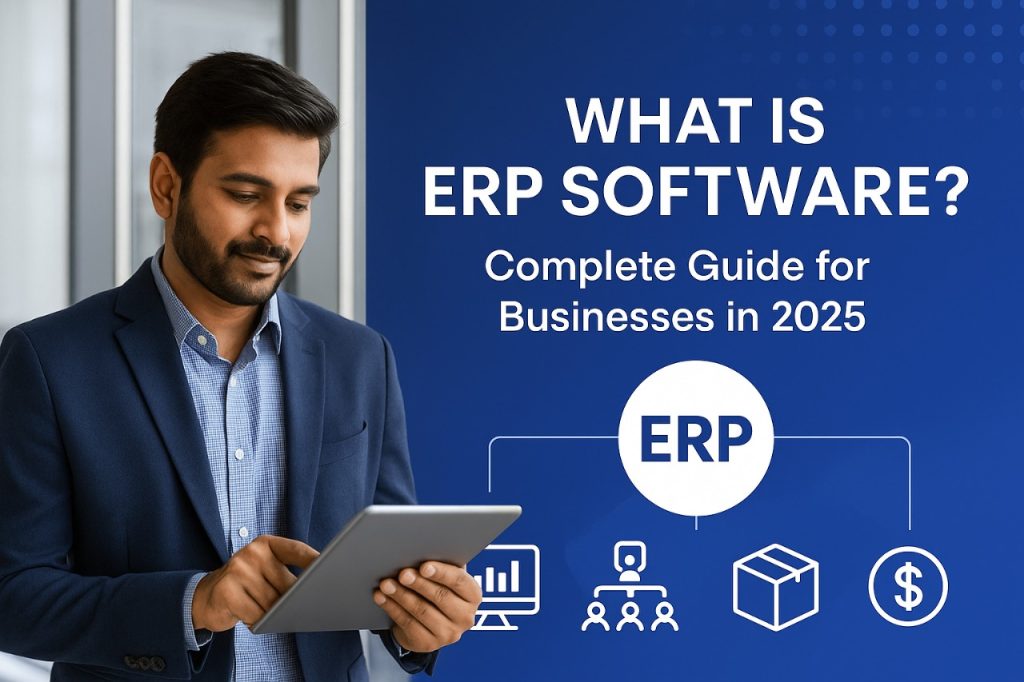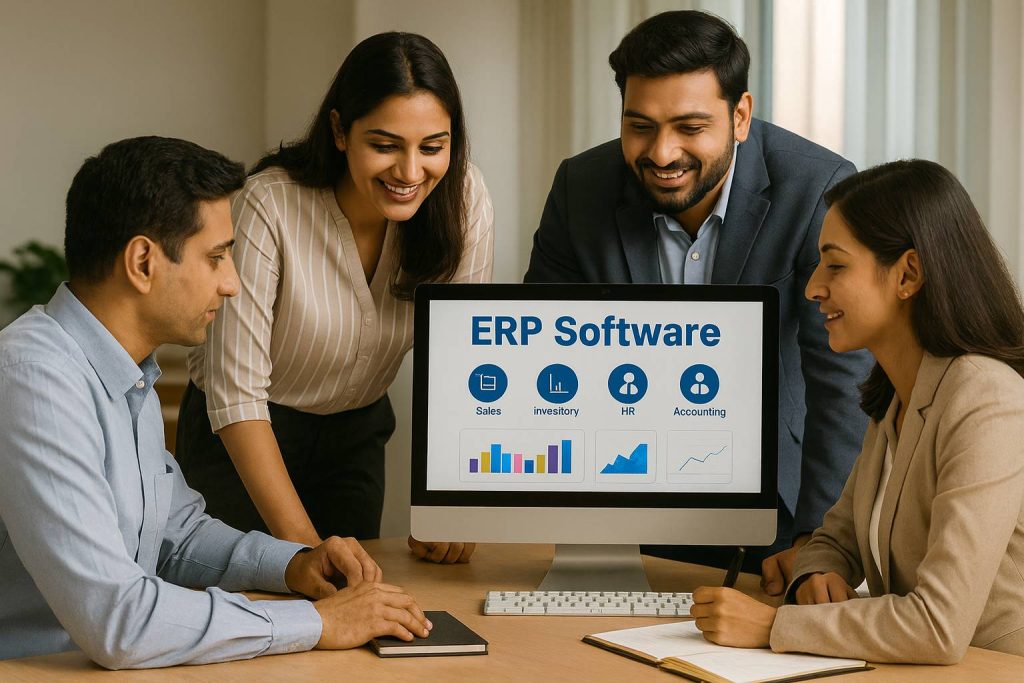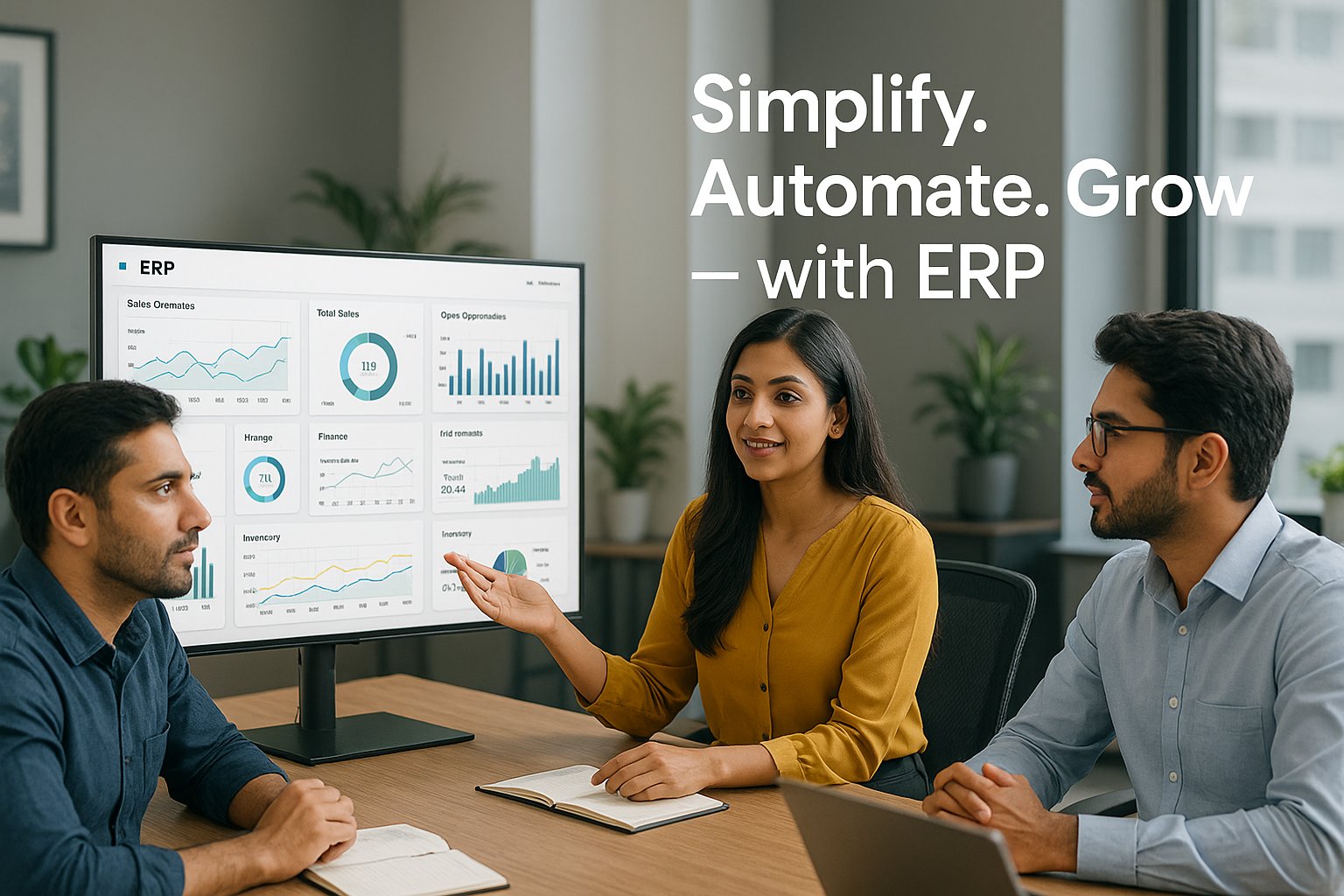In 2025, business success hinges on how efficiently you manage operations — from sales and stock to HR and finances. That’s where ERP software (Enterprise Resource Planning) comes in. Whether you’re running a retail store, restaurant, manufacturing unit, or service-based business, ERP software helps centralize your operations into one powerful platform.Table of Contents
🚀 Key Modules of ERP Software
Sales & Billing – GST-compliant invoicing, order processing, and customer billing
Inventory Management – Real-time stock tracking, alerts, and valuation
Purchases & Vendor Management – Streamlined purchase orders and supplier tracking
Accounting – Automated journal entries, ledgers, and financial reporting
HR & Payroll – Attendance, salary calculation, and compliance reports
CRM & Customer Loyalty – Manage leads, customers, and personalized promotions
🎯 Benefits of ERP Software in 2025
✅ Centralized Operations – One system for all departments
✅ Real-Time Insights – Live dashboards and reports for better decisions
✅ Cost Savings – Reduce manual tasks, errors, and delays
✅ GST & Compliance Ready – Stay tax-ready without hassle
✅ Scalable for Any Business – Whether you’re a startup or a multi-branch chain
📊 Who Should Use ERP Software?
ERP is ideal for:
- Retailers and wholesalers
- Restaurants and cafés
- Manufacturers
- Distributors and service providers
- Multi-location businesses
If you’re facing challenges like stock mismatches, delayed billing, or disconnected systems — ERP is your solution.
How ERP Works – A Simple Breakdown.
- A sale happens → inventory auto-adjusts
- Payment received → accounting auto-updated
- Stock reaches reorder level → auto-purchase alert generated
- New employee added → HR module updated
One action triggers updates across all modules.
That’s the power of an integrated ERP.
“Smarter Business Starts Here — Understand ERP in 2025”

Types of ERP in 2025
On-Premise ERP
Installed locally on a company’s own servers. Suitable for large enterprises requiring high customization and control over data.
Cloud-Based ERP (SaaS ERP)
Hosted on the vendor’s cloud server, accessible via internet. Cost-effective, scalable, and ideal for small to mid-sized businesses.
Hybrid ERP
Combines on-premise and cloud ERP features. Offers flexibility by keeping sensitive data in-house while using cloud for other functions.
Industry-Specific ERP
Tailored for niche industries like:
- Retail ERP (e.g., RetailMass)
- Restaurant ERP (e.g., RestroPro)
- Manufacturing ERP
- Healthcare ERP
- Construction ERP
These systems address the unique processes and compliance needs of each sector.
Key Industries Using ERP Software in 2025
ERP software is no longer industry-specific. With modular flexibility and cloud access, businesses across sectors are adopting ERP to automate and scale. Here’s how different industries benefit:
✅ Retail Industry
- Manage inventory in real-time
- POS billing with customer loyalty integration
- Multi-branch stock transfers & reports
✅ Restaurants & Cafés
- KOT system with table-wise billing
- Ingredient-based inventory deduction
- Franchise menu and pricing control
✅ Manufacturing
- Bill of Materials (BOM) handling
- Production planning and cost tracking
- Raw material procurement linked to sales
✅ Distributors & Wholesalers
- Route-based order fulfillment
- Credit sales and outstanding tracking
- Centralized purchase + decentralized delivery
✅ Service Providers
- CRM and task management
- Project-based billing
- Employee productivity tracking
🧭How ERP Supports Business Growth
ERP is more than automation — it’s a scaling tool.
| Without ERP | With ERP |
|---|---|
| Disconnected tools | Unified software system |
| Manual data entry | Real-time sync across modules |
| Reactive decisions | Predictive reporting & insights |
| Risk of errors & delays | Accurate workflows with alerts |
| Hard to scale beyond a single store | Supports multi-location & multi-user ops |
As your business grows, ERP grows with you — making it a future-ready investment.

ERP on Mobile: Access Anywhere, Anytime
Modern ERP software in 2025 isn’t confined to desktops.
You can now:
- View live stock, sales & reports from your phone
- Approve orders and expenses remotely
- Send invoices & share reports instantly
- Track attendance via geo-fencing (for field teams)
Cloud + mobile ERP = 24/7 control of your business, wherever you are.
Common ERP Integrations in 2025
To become a true hub of your business, ERP systems now integrate with:
- 📦 E-commerce platforms (Shopify, WooCommerce)
- 💳 Payment gateways (Razorpay, PhonePe, Stripe)
- 📊 BI tools (Power BI, Google Data Studio)
- 📞 CRM & Call tracking tools
- 📢 Marketing platforms (Mailchimp, WhatsApp Business API)
Choose an ERP system that is API-ready and supports plug-and-play integrations.
Why Businesses Fail Without ERP?
No Real-Time Business Visibility
Businesses without ERP often operate reactively because they lack instant access to sales, stock, and financial data. Decisions are made based on outdated reports or gut feelings, leading to missed opportunities or costly mistakes. ERP provides real-time dashboards that allow business owners to act fast and make informed decisions.
Scattered, Inconsistent Data
When operations depend on Excel sheets, manual registers, or disconnected software, data gets duplicated, outdated, or lost. Without centralized data, different departments end up using conflicting information — which creates confusion, miscommunication, and delays. ERP unifies all business data in one secure system.
Poor Inventory Control
Retailers and distributors without ERP software often face inventory nightmares. From overstocking slow-moving items to running out of fast-selling products, the inability to track inventory in real-time leads to lost revenue and unhappy customers. ERP software ensures stock accuracy with auto-adjustments, batch tracking, and reorder alerts.
Manual Errors in Billing and Accounts
Billing manually or through outdated tools leads to pricing errors, missed invoices, and reconciliation issues. Credit sales go untracked, payments are delayed, and accounting becomes a mess. ERP software automates the billing process, applies tax rules, and keeps your accounts balanced with zero duplication.
Compliance and GST Filing Challenges
Without ERP, many businesses struggle to maintain tax compliance. Manual GST calculations or missing e-invoices can result in legal issues or penalties during audits. ERP software simplifies compliance by generating GST-ready invoices, TDS records, and tax reports on time — every time.
Lack of Business Insights and Reports
Business growth requires data — not guesses. Without ERP, businesses rely on outdated reports, making forecasting and planning difficult. ERP provides visual reports, profit/loss summaries, and trend analysis to help you monitor performance and grow strategically.
Departmental Silos and Communication Gaps
When HR, sales, inventory, and accounts don’t use a shared system, communication gaps arise. Orders are delayed, payroll is miscalculated, and stock updates don’t reflect in accounts. ERP connects every department, streamlining operations and ensuring everyone is on the same page.
Dependency on Individuals, Not Systems
Small businesses often rely on a few key employees who manage everything manually. But what happens if they leave? ERP eliminates that risk by systematizing operations. Anyone with the right permissions can access data and keep the business running.
No Scalability or Flexibility
As businesses grow, manual systems break down. New stores, branches, or online channels can’t be managed with Excel and basic billing software. ERP software supports multi-location operations, user management, and integrated workflows — making it easy to scale without friction.
Declining Customer Satisfaction
Today’s customers expect speed, accuracy, and digital convenience. Delays in billing, incorrect orders, or missing stock information lead to bad reviews and customer churn. ERP software ensures faster service, accurate data, and a smooth experience across all touchpoints.
Frequently Asked Questions
✅ What is ERP software in simple terms?
ERP (Enterprise Resource Planning) software is a system that helps businesses manage their daily operations — like billing, inventory, sales, accounting, HR, and more — in one integrated platform. Instead of using separate tools for each function, ERP brings everything together to save time, reduce errors, and improve efficiency.
✅ Is ERP only for large companies?
No, ERP software is now widely used by small and medium-sized businesses (SMEs) as well. With affordable cloud-based ERP solutions available, even startups and single-store businesses can use ERP to manage operations professionally. In fact, SMEs benefit the most by replacing manual tasks and disconnected tools.
✅ How long does it take to implement ERP software?
The time required depends on the complexity of your business and the number of modules involved. For small businesses with standard billing and inventory needs, ERP can be implemented in 1–2 weeks. For multi-branch companies with custom workflows, it may take 3–6 weeks, including training and data migration.
✅ Do I need technical knowledge to use ERP?
No. Modern ERP systems are designed to be user-friendly and intuitive. Most users can learn how to operate the system within a few hours of guided training. The ERP provider usually offers setup, onboarding, and support to help your team get started without technical hassle.
✅ What modules are typically included in ERP software?
Common ERP modules include:
- Sales & Billing
- Inventory Management
- Purchasing & Vendor Management
- Accounting & Finance (TDS, GST)
- HR & Payroll
- CRM (Customer Relationship Management)
- Reports & Analytics
You can choose to start with a few modules and add more as your business grows.
✅ Is ERP software GST-compliant?
Yes, most ERP systems built for Indian businesses are 100% GST-compliant. They help you generate GST-ready invoices, calculate tax automatically, and prepare reports for filing. Many ERPs also support e-invoicing, TDS, and audit-ready financials.
✅ What’s the difference between ERP and POS software?
POS (Point of Sale) software focuses only on billing and sales — mainly for retail counters. ERP software, on the other hand, includes POS features but goes beyond to manage inventory, accounting, payroll, purchase, CRM, and more — all in one platform. ERP is a complete business management system, while POS is just one part of it.
✅Can ERP software be used on mobile?
Yes. Most cloud-based ERP platforms offer mobile apps or mobile-friendly dashboards. This means business owners can check sales, inventory, customer records, or approve orders even when they’re not in the office — using just their phone or tablet.
✅ Is cloud-based ERP safe?
Modern cloud ERP systems are built with strong encryption, role-based access, and regular data backups. Your business data is stored securely on trusted cloud servers (like AWS or Google Cloud). Cloud ERP is often safer and more reliable than local, device-based storage.
✅ How do I choose the right ERP software?
Look for ERP software that is:
- Easy to use and customize
- Built for your business type (retail, restaurant, service, etc.)
- GST-compliant and audit-friendly
- Scalable as your team and branches grow
- Backed by reliable customer support
- Affordable with clear pricing (no hidden costs)
Ask for a demo, check client reviews, and ensure the vendor provides ongoing training and support.
Ready to Achieve Seamless ERP Implementation in 2025?
Making your ERP vision a reality is not just about choosing good software. It is about addressing deep operational challenges, managing change, and ensuring measurable results. As highlighted in this article, Indian business leaders struggle with fragmented workflows, low adoption rates, and the overwhelming complexity of aligning new systems with long-term growth. You need solutions that go beyond checklists and deliver meaningful business transformation. That is where Wider ERP from Zymofar steps in.

Experience how AI-powered automation, predictive analytics, smart inventory management, and chatbot support can turn your ERP investment into a genuine growth engine. Start reducing inefficiencies, enhance user adoption, and gain real-time insights for smarter decisions. Visit Zymofar today to learn how our end-to-end support, custom integrations, and demo options can help your business move forward with confidence. Take the next step now and unlock your path to data-driven excellence. Request your demo or connect with an expert right here: Wider ERP details.


